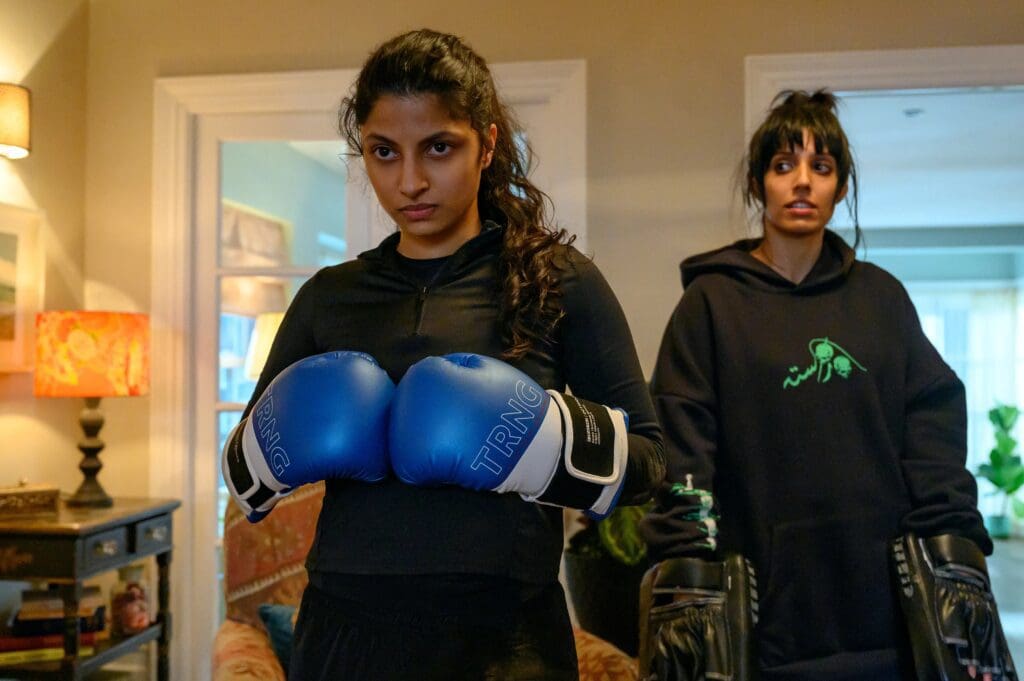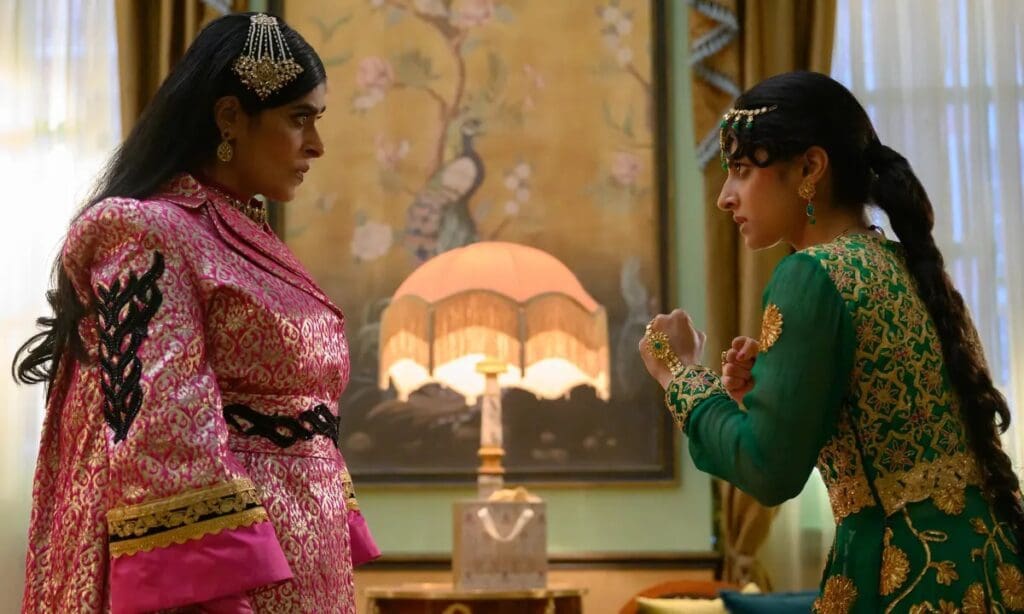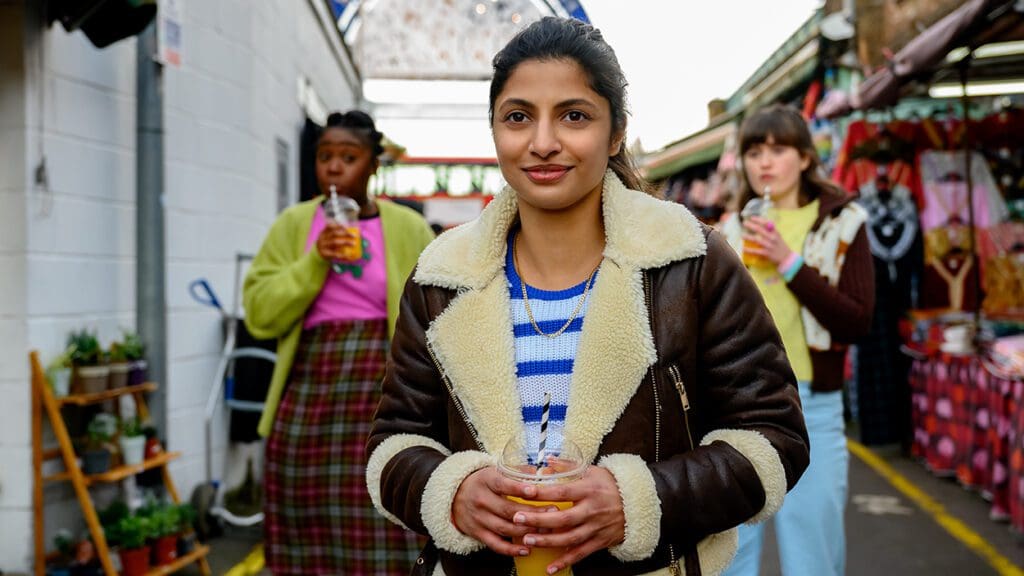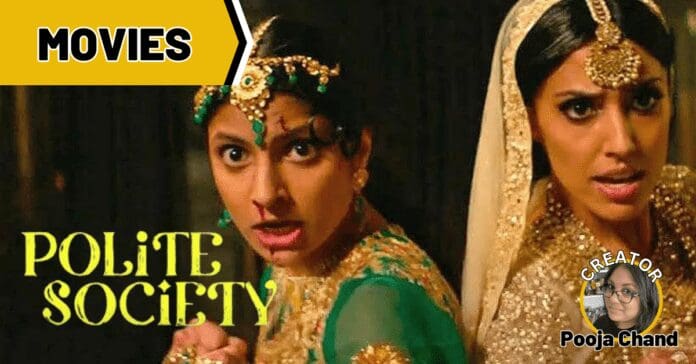Share this
What better way to open the doors to Asian and Pacific Islander Heritage Month than with a film led and directed by South Asians? That’s right, Nida Manzoor’s Polite Society is finally in theaters and it is the movie to see as soon as you can. The film follows two Pakistani Muslim sisters, Ria Khan, a high school teen who dreams of becoming a stuntwoman, and her older sister Lena, an art school dropout. When Lena ends up betrothed to the only son of a wealthy and high status family, Ria suspects something isn’t right, and takes it upon herself to investigate further and save her sister.
Polite Society is the type of story that is so wildly different that it wasn’t quite clear until now that this is what the South Asian community needed. The film is a comedic riot from beginning to end that manages to combine the aesthetics of a fighting arcade game, the essence of South Asian culture, and a much needed yet vaguely familiar twist to bring the story to a satisfying close. With incredible fight sequences, an entire dance number, and fun storytelling visuals, the film keeps the audience engaged and entertained at every turn.
Read Also: “The Romantics” – A Love Letter To Yash Raj Films

And sure, at a surface level glance, it looks like a film that centers on marriage, and while that does play a part in the story, it is not the focus by a long shot. What really takes the center stage is the female relationships that are seen throughout the film. Whether it’s Ria and Lena, or even Ria and her best friends, these relationships are shown in a positive and healthy light. There are many instances in film and television where women, especially South Asian women, are made to compete against each other until one prevails over the other.
However, Polite Society blatantly ignores this harmful trope by pushing for a united front amongst our protagonists and supporting characters against a mutual enemy. We see this in particular with Ria and Lena, when the threat of having their ability to choose their life path is very present and very near. Ria is absolutely concerned about her future but that becomes nothing compared to the danger she suspects her sister might be in, and it makes for a wholesome bond that cannot be broken in the end.

But another rare but important discussion that occurs is one regarding the ever so toxic “Mommy and Son” relationships that are all too common within the community and seen as the norm. Polite Society takes this trope to an extremely uncomfortable level but executes it so well that the audience doesn’t even see it coming. The discussion soon turns into one about respect and boundaries, and taking power back into our own hands as women.
Something that we can’t avoid discussing are the spectacular performances across the board, especially from our two leads. Priya Kanara as Ria is an absolute delight to watch as she brings about an engaging presence on the big screen which has people waiting to see what projects she’ll be doing next. Ritu Arya is also phenomenal as Lena as she pulls off such earnest sisterly chemistry with Kansara that you genuinely believe they are sisters. And Nimra Bucha is as menacing as she can be as the expected mother-in-law. Rather than feeding directly into the toxic aunty trope, she creates her own style of terror for her character.

Polite Society is a film that needs to be experienced firsthand to fully understand why people are raving about it and showering it with love. It’s new and refreshing, but also takes overused tropes to a whole new level, and throws in twists we never would have seen coming despite how obvious it was. Every character brings in something unique to the already chaotic plot, and in the end, it comes together so well. If you’re looking for something original and fun, this is the movie for you. Polite Society is without a doubt a story about the bond between sisters but make no mistake, there is something in this movie for everyone. You just have to see it for yourself!
Samosa Rating:

Polite Society receives 5 out of 5 Samosas.
Polite Society is now playing in theaters.
Runtime: 1h 43m


